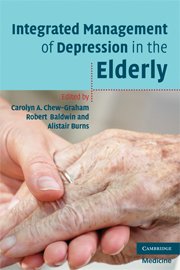Book contents
- Frontmatter
- Contents
- Contributors
- Foreword
- Preface
- Acknowledgements
- 1 Late-life depression: an introduction
- 2 Management of late-life depression
- 3 Management of late-life depression in primary care: case studies UK
- 4 Management of more complicated depression in primary care: case studies UK
- 5 Management of late-life depression across primary and secondary care: case studies UK
- 6 Management of late-life depression around the world: summary of international commentaries
- 7 Resources
- Appendix: International commentaries
- Index
- References
3 - Management of late-life depression in primary care: case studies UK
Published online by Cambridge University Press: 18 December 2009
- Frontmatter
- Contents
- Contributors
- Foreword
- Preface
- Acknowledgements
- 1 Late-life depression: an introduction
- 2 Management of late-life depression
- 3 Management of late-life depression in primary care: case studies UK
- 4 Management of more complicated depression in primary care: case studies UK
- 5 Management of late-life depression across primary and secondary care: case studies UK
- 6 Management of late-life depression around the world: summary of international commentaries
- 7 Resources
- Appendix: International commentaries
- Index
- References
Summary
In order to illustrate the integrated management of depression in older people in UK primary care, we asked contributors to provide commentaries on a selection of cases drawn from real-life scenarios. The following three chapters contain these commentaries together with a summary by the editors. The first three cases illustrate the management of patients with mild to moderate depressive symptoms in primary care.
A request for sleeping tablets
Mr Seth Y, aged 69 years, presents to his GP complaining that he can't sleep. He admits to feeling upset and worried, although he doesn't know why. He denies that anything has recently happened to him, but the practice receptionist is aware that his son and family have emigrated to New Zealand, and both Mr and Mrs Y have admitted to the staff at the desk that they miss their grandchildren. He comes to see the GP to ask for some sleeping tablets.
Mr SY doesn't often attend the practice, he has been on Losartan for hypertension for five years and his recent review with the nurse (including cholesterol and renal function) was satisfactory.
Please describe the assessment of Mr SY in the GP consultation. Discuss the options available for the management of the patient. Besides medication, what strategies are available for the management of Mr SY's insomnia?
Mr SY does not attend surgery frequently, so his request for sleeping tablets would seem unusual and arouse my curiosity.
- Type
- Chapter
- Information
- Integrated Management of Depression in the Elderly , pp. 33 - 54Publisher: Cambridge University PressPrint publication year: 2008



